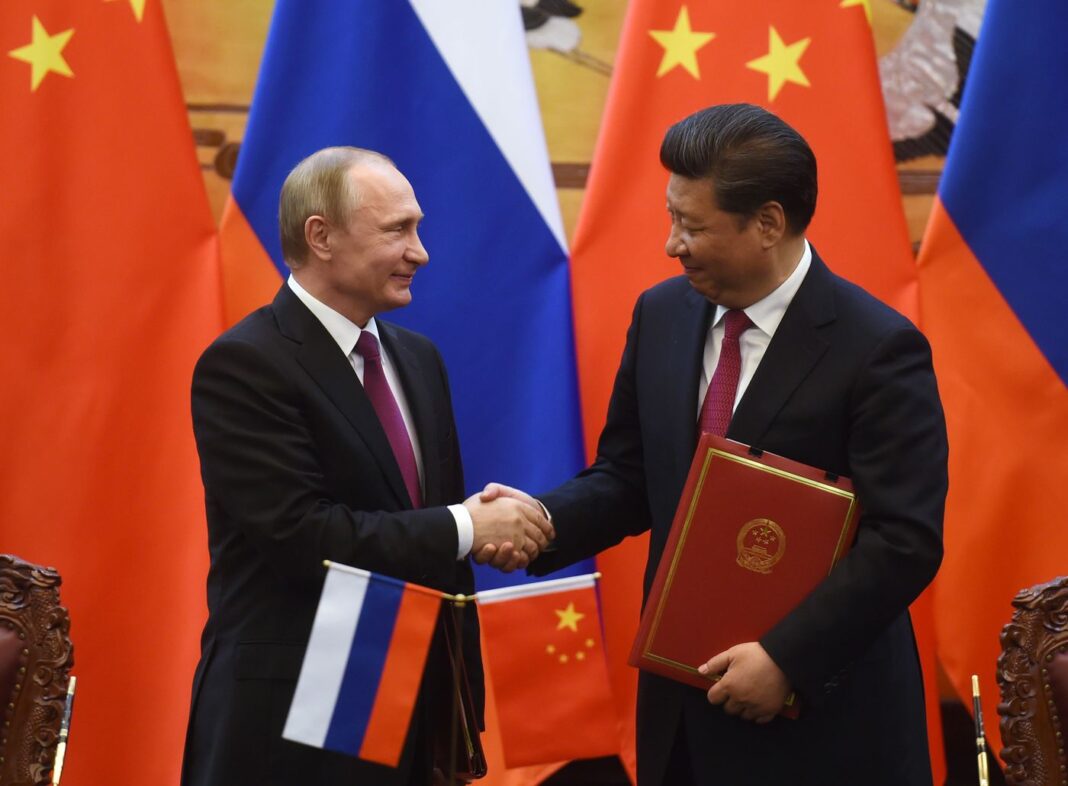Everywhere the US looks, its geopolitical rivals are making common cause. Russia and China proclaimed a strategic partnership “without limits” just before the former’s invasion of Ukraine. Iran is helping Russian President Vladimir Putin fight that war by providing him with military assistance. Beijing and Tehran have their own strategic relationship, one that’s been several decades in the making.
Washington doesn’t yet face a full-fledged alliance of hostile powers. But that’s the wrong way to think about the convergence between three countries that are increasingly united in their hostility to the US.
For Americans, formal military alliances are the gold standard of international cooperation. That’s not surprising, given that Washington has dozens of treaty allies around the globe. Those relationships play a vital role in US strategy, and they have given many Americans a particular view of what an alliance entails.
US alliances mostly involve mutual defense commitments enshrined in treaties. They are often rooted in deep bonds of solidarity created by shared interests and democratic values. These alliances promote cooperation across an array of security challenges, from counterterrorism to holding back Russian and Chinese power; US and partner allies plan, train and operate together closely. American alliances are also presumed to be enduring, rather than temporary: The North Atlantic Treaty Organization and America’s key security pacts in the Western Pacific have been around for generations.
Ties between Iran, China and Russia are unimpressive in comparison. These countries have made no formal public commitments to defend one another. Their interactions are often suffused with mistrust.
Putin is surely furious that Chinese President Xi Jinping has mostly left him to his own devices in Ukraine; Tehran and Moscow are rivals for influence in the Middle East. Whereas it is nearly impossible to conceive of a future in which America and, say, the UK become enemies, it is all too easy to imagine how expansionist autocracies could eventually turn on each other.
Iran, Russia and China aren’t allies in the way that Americans typically use that term. But maybe they don’t need to be.
America’s alliances are historically unusual. Before the mid-20th century, European diplomacy frequently featured narrow, transactional partnerships. Key alliances, such as the Anglo-French-Russian Triple Entente before World War I, lacked explicit defense commitments and were based on a collection of looser understandings. Even the most notorious, destructive alliance in modern history — the Tripartite Pact among the Axis powers Germany, Italy and Japan in World War II — was shot through with cynicism and mutual antipathy.
In considering relations between America’s rivals, the question is not whether they meet Washington’s definition of an alliance, or even whether the parties call themselves allies. It is whether the relationship produces enough real cooperation to change the strategic landscape.
The answer today is clearly yes. The China-Russia partnership features robust arms sales, military exercises and technological cooperation. Moscow and Beijing have worked together to shore up autocracies in Central Asia, weaken international human-rights norms, and promote autocrat-friendly approaches to managing the internet. Perhaps most important, the two countries have resolved many of the tensions that once plagued their relationship so that they can focus their hostility on the common enemy: the US.
Both nations have also sought stronger ties with Iran. Tehran and Moscow were military allies in Syria in 2015, joining forces to save Bashar al-Assad’s government and checkmate a US policy that sought his ouster. Russian and Chinese arms sales have long strengthened the Iranian military; economic and diplomatic ties have helped Tehran lessen the impact of international sanctions.
Iran and China formalized their longstanding relationship through a 25-year strategic partnership agreement signed in 2021. Russia-Iran ties are still more significant. Iran is reportedly giving Moscow drones and lessons in sanctions evasion, which are quite useful amid a continuing war in Ukraine.
The Russians are helping Iran with its satellite program and providing preferential access to grain supplies. This Russia-Iran convergence, US National Security Adviser Jake Sullivan has remarked, is “something that the whole world should look at and see as a profound threat.”
It’s easy to understand the logic of this cooperation. All three autocratic powers seek to preserve and protect illiberal political systems, push the US out of their geographic neighborhoods, and roll back a post-Cold War order dominated by Washington.
And while Moscow, Tehran and Beijing are not eager to fight one another’s battles, they surely realize there is strength in numbers when it comes to challenging a superpower: They can put American power under strain on multiple fronts at once.
Conversely, the regimes in Russia, China and Iran all understand that if any of them is decisively defeated by Washington or its allies, those revisionists that remain will become more lonely and vulnerable. That’s reason enough for the world’s leading autocracies to pull together, whether they — and we — call it an alliance or not.
To contact the author of this story:
Hal Brands at [email protected]
To contact the editor responsible for this story:
Tobin Harshaw at [email protected]

